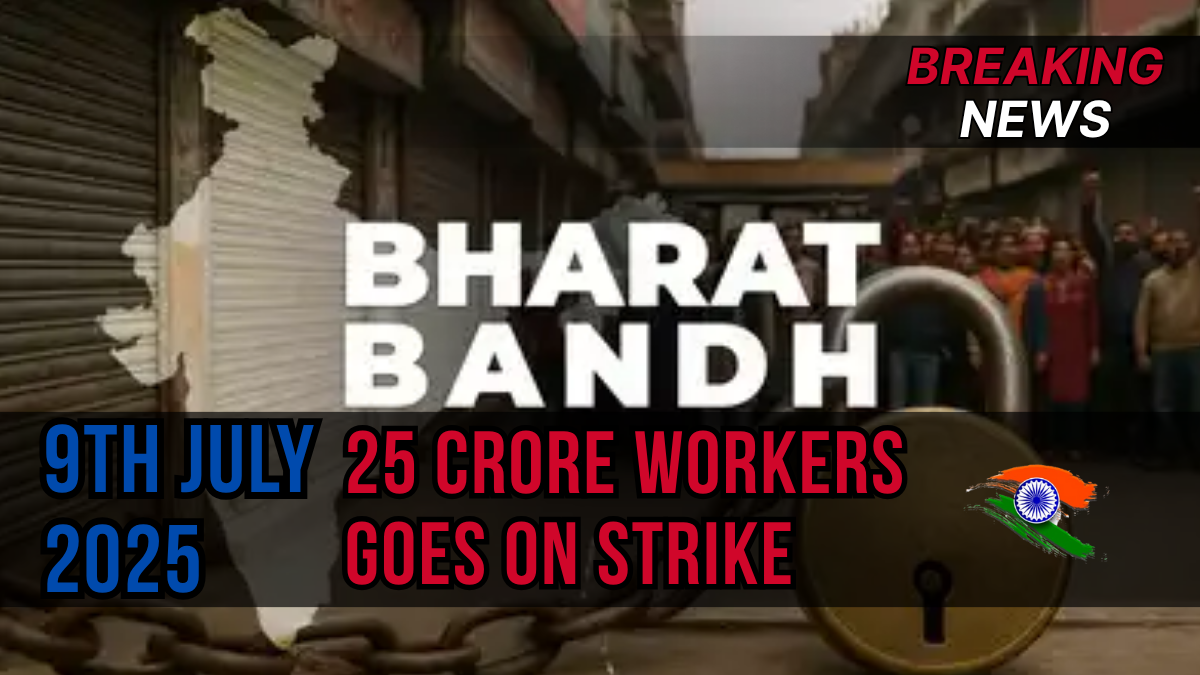A massive nationwide strike is set to disrupt India on July 9, 2025, as over 25 crore workers across multiple sectors prepare to participate in what trade unions are calling a “Bharat Bandh.” The strike represents one of the largest coordinated labor actions in recent years, with potentially significant impacts on daily life across the country.

What Is the Bharat Bandh?
The Bharat Bandh is a nationwide general strike organized by a forum of 10 central trade unions and their associates. The term “bandh” translates to “closure” in Hindi, and these strikes are designed to shut down normal economic activity to draw attention to workers’ grievances.
This particular strike aims to protest what unions describe as “anti-worker, anti-farmer and anti-national pro-corporate policies of the government.” The coordinated action represents months of preparation by unions across both formal and informal sectors of the economy.
Who Is Participating?
The strike involves a coalition of major trade unions including:
- All India Trade Union Congress (AITUC)
- Indian National Trade Union Congress (INTUC)
- Hind Mazdoor Sabha (HMS)
- Centre of Indian Trade Unions (CITU)
- All India United Trade Union Centre (AIUTUC)
- Trade Union Coordination Centre (TUCC)
- Self Employed Women’s Association (SEWA)
- All India Central Council of Trade Unions (AICCTU)
- Labour Progressive Federation (LPF)
- United Trade Union Congress (UTUC)
Workers from diverse sectors are expected to join the strike, including those in banking, insurance, postal services, coal mining, construction, factories, and state transport services. The Samyukta Kisan Morcha and joint front of agricultural workers unions have also extended their support, meaning farmers and rural workers will participate alongside urban laborers.
Why Are Workers Striking?
The unions have submitted a comprehensive charter of 17 demands to Labour Minister Mansukh Mandaviya, which they claim the government has ignored. Their primary grievances include:
Labor Policy Concerns
Trade unions strongly oppose the government’s four new labor codes, which they argue will weaken collective bargaining rights, increase working hours, and reduce workers’ ability to strike. The unions believe these codes favor employers at the expense of worker protections.
Economic Policies
The forum alleges that the government has abandoned its welfare state responsibilities and is prioritizing corporate interests over worker welfare. They cite concerns about privatization of public sector enterprises, outsourcing policies, and the casualization of the workforce.
Governance Issues
Workers claim the government hasn’t conducted the annual labor conference for the past decade, making decisions without proper consultation with labor representatives. They also express concerns about unemployment, rising prices of essential goods, and cuts to social sector spending in education and healthcare.
Which Services Will Be Affected?
The strike is expected to significantly impact several key sectors:
Banking and Financial Services
The Bengal Provincial Bank Employees Association, affiliated with the All India Bank Employees Association (AIBEA), has confirmed that banking services will be disrupted. While no official bank holiday has been declared, customers should expect limited services on July 9.
Transportation
State transport services, including buses and other public transportation, are likely to be affected. Private transportation services like taxis and app-based cab services may also experience disruptions.
Power and Utilities
Over 27 lakh (2.7 million) power workers are expected to participate, potentially affecting electricity supply across the country.
Postal and Communication Services
Postal services will likely face disruptions as postal workers join the strike.
Mining and Manufacturing
Coal mining operations and various factories are expected to halt operations during the strike.
What Remains Open?
Despite the widespread nature of the strike, several services and institutions are expected to continue operating:
Schools and Colleges
Educational institutions are likely to remain open, as states have not issued holiday notifications for schools and colleges due to the Bharat Bandh.
Private Offices
Most private companies and offices are expected to operate normally, though some may face indirect impacts due to transportation disruptions.
Essential Services
Emergency services, hospitals, and other critical infrastructure typically continue operating during such strikes, though they may face some staffing challenges.
Historical Context
This isn’t the first major strike in recent years. Trade unions have previously organized similar nationwide strikes on November 26, 2020, March 28-29, 2022, and February 16, 2024. These strikes have become a regular tool for organized labor to express dissatisfaction with government policies.
The current strike represents a continuation of long-standing tensions between trade unions and the government over economic reforms, labor laws, and worker rights.
Economic Impact
With over 25 crore workers potentially participating, the economic impact could be substantial. Key sectors like banking, transportation, and power generation form the backbone of India’s economy, and disruptions in these areas can have ripple effects across other industries.
The strike comes at a time when India is focusing on economic growth and development, making the timing particularly significant for both the government and the business community.
Government Response
The government has not announced any specific measures in response to the strike call. However, essential services are typically maintained during such events, and authorities usually prepare contingency plans to minimize disruptions to critical infrastructure.
Preparing for the Strike
Citizens should prepare for potential inconveniences on July 9 by:
- Planning alternative transportation arrangements
- Completing urgent banking transactions beforehand
- Stocking up on essential supplies if needed
- Staying informed about local conditions through news updates
Looking Ahead
The success or failure of this strike will likely influence future labor-government relations in India. If the strike achieves significant participation and disruption, it may strengthen the unions’ negotiating position. Conversely, if the impact is limited, it could weaken their influence in policy discussions.
The strike also highlights the ongoing debate about India’s economic direction and the balance between business-friendly policies and worker protections. As the country continues to modernize its economy, these tensions are likely to persist.
What This Means for India
The July 9 Bharat Bandh represents more than just a work stoppage—it’s a significant political and economic event that reflects deeper tensions in Indian society. The scale of participation will serve as a barometer of worker sentiment and could influence future government policies on labor, economic reforms, and social welfare.
For ordinary citizens, the strike serves as a reminder of the complex relationships between workers, employers, and government in India’s evolving economy. While the immediate impact may be measured in terms of disrupted services and economic losses, the longer-term significance lies in what it reveals about the direction of India’s labor movement and economic policies.
As India continues its journey toward becoming a global economic powerhouse, strikes like this highlight the need for balanced policies that promote both economic growth and worker welfare. The resolution of these tensions will play a crucial role in shaping India’s economic future.
FAQs About Bharat Band
Q. What is Bharat Bandh?
A. Bharat Bandh refers to a nationwide strike in India, where workers and unions come together to protest or demand actions on specific issues, such as labor rights, economic policies, or other pressing concerns.
Q. When is the Bharat Bandh happening?
A. The Bharat Bandh is scheduled for July 9, 2025.
Q. How many workers are participating in the strike?
A. Approximately 25 crore (250 million) workers are expected to participate in the strike.
Q. What are the key demands of the workers?
A. The demands include better wages, social security, improved working conditions, and opposition to policies perceived as anti-labor.
Q. Which sectors will be affected by the Bharat Bandh?
A. Sectors like transportation, banking, manufacturing, and public services are likely to be significantly impacted due to the large-scale participation of workers.
Q. Will emergency services be available during the strike?
A. Emergency services, such as hospitals and ambulances, are generally kept functional during strikes, but minor disruptions may be possible. It is advisable to plan accordingly.
Q. How can citizens prepare for the Bharat Bandh?
A. Citizens can prepare by stocking essential items, planning travel ahead of time, and staying updated on news related to the strike’s impacts on services in their area.
For More Information Click Here



